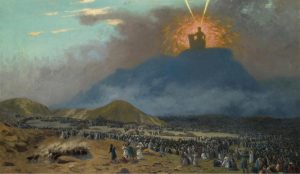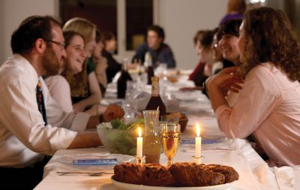Sabbath: A Time to Recalibrate
 This blog is Part One of a series written over a period of months in 2025 (see Introduction)
This blog is Part One of a series written over a period of months in 2025 (see Introduction)
One Sunday afternoon in the eighties, when my husband’s parents were visiting for some weeks, I vividly recall my Brethren father-in-law stubbornly sitting on our sofa with his arms folded, doing nothing. Outside, my husband, after working the other six days as a family doctor, dug a huge hole for our kids swimming pool, alone. The issue was the Sabbath.
When we think of what the Bible has to say about holy days, our thoughts usually turn first to the notion of Sabbath, a principle deeply embedded in Biblical history and still observed by Jews today. It is passed down to us from the time of Moses, and his encounter with God on the mountain at Sinai/Horeb. On that day the Lord gave him Ten Commandments to govern the life of the People of Israel, not just in the wilderness, but in their community life over thousands of years to come:
‘Remember the Sabbath day and keep it holy. Six days you shall labour and do all your work. But the seventh day is a Sabbath to the Lord your God; you shall not do any work – you, your son or your daughter, your male or female slave, your livestock, or the alien resident in your towns. For in six days the Lord made heaven and earth, the sea, and all that is in them, but rested the seventh day; therefore the Lord blessed the Sabbath day and consecrated it.’ Exodus 20: 8–11 (NRSV)
Exodus provides us with a helpful, concise definition of this first holy day, which will keep us focussed as we move through some other themes. That said, while these verses give us a clear template for what the Sabbath day should not include – the regular work that enables us to put food on the table and a roof over our head – it is light on the detail of what the Sabbath should look like.
We do get some clues. The Sabbath is centred on God, not ourselves. It’s a chance to recalibrate, to lift our attention from the preoccupations of the week, and to focus on who God is and what He has called us to be.
 BRF‘s Louise Davis, who inspired this blog series, says that we Christians sometimes confine ourselves to a ‘very small box’ regarding the Sabbath. That Sunday afternoon when my father-in-law refused to help with the pool project brought that home to me. At their house, they didn’t do laundry on a Sunday either, but with us having four children in the days of cloth nappies, Dad just had to accept that when they came to stay, the machine would be going every day. In that era, most folk at church frowned on us buying hot “Sunday bread” as they thought that was wicked too; how things have changed! Imagine what might happen if they had given themselves permission to think outside of that small box.
BRF‘s Louise Davis, who inspired this blog series, says that we Christians sometimes confine ourselves to a ‘very small box’ regarding the Sabbath. That Sunday afternoon when my father-in-law refused to help with the pool project brought that home to me. At their house, they didn’t do laundry on a Sunday either, but with us having four children in the days of cloth nappies, Dad just had to accept that when they came to stay, the machine would be going every day. In that era, most folk at church frowned on us buying hot “Sunday bread” as they thought that was wicked too; how things have changed! Imagine what might happen if they had given themselves permission to think outside of that small box.
My friend Lynne Baab has written heaps on the Sabbath; her family lived in Israel for a year in the 80’s and learned to see the legally-enforced rest day as a gift that they took back to the US when they returned. For them it was more about rest than religion, though clearly she and husband Dave are committed believers and shared worship will aways play a part. But that small box we tend to assign to keeping Sabbath can be very constricting. Lynne writes in her blog about an American Christian woman she met, who enthusiastically explained how their family was going to keep a more Biblical Sabbath. The lady said:
“I love the idea of starting on Saturday at sunset with a festive meal. I’d like to have special food, blessings for the children, prayers and candles, like Jewish people do. Maybe we could sing some songs. Then the next day, after we go to church, I hope we can read some Bible stories, do some crafts, really help the kids to centre the day around God.”
Lynne’s response was to ask, “What do you plan to stop doing on the sabbath?” She was met with a blank look. Stopping, slowing down, had not been taken into consideration; for this family, it was all about doing more. But Sabbath is much more about being than doing. We can turn the Sabbath into one more thing to do perfectly, one more task to achieve.
 Instead of inhabiting that very small box, grace allows us to think outside it. We are free to be creative: how, where, when, and with whom we choose to focus on God is entirely up to us. On their return to the US, the Baabs thought carefully about what work they would avoid on the sabbath. For her as a part-time student and stay-at-home mom, work consisted of studying, housework, and shopping. Dave’s work involved anything from his paid job, as well as house repairs and mowing the lawn. They chose not to do those things on Sundays, the day most Christians observe as Sabbath. As the years passed and the children grew up, their practice changed. But two things stayed constant: no work and a slower pace.
Instead of inhabiting that very small box, grace allows us to think outside it. We are free to be creative: how, where, when, and with whom we choose to focus on God is entirely up to us. On their return to the US, the Baabs thought carefully about what work they would avoid on the sabbath. For her as a part-time student and stay-at-home mom, work consisted of studying, housework, and shopping. Dave’s work involved anything from his paid job, as well as house repairs and mowing the lawn. They chose not to do those things on Sundays, the day most Christians observe as Sabbath. As the years passed and the children grew up, their practice changed. But two things stayed constant: no work and a slower pace.
Baab mentions a person who says that on the Sabbath she chooses not to be identified with any of the roles that she fulfils in her working life, and in fact, anything that appears on a to-do list. She just revels in being a beloved child of God. this lady told how it took her several years of observing such a Sabbath to be able to do that, but that now it is the highlight of her week, “like changing into comfortable clothes”. Of course for Lynne Baab – and for me – being a clergyperson usually means your job is focused on Sundays. That why many pastors take a Sabbath approach to their ‘day off’ – one day in seven, whenever it is. In my unpredictable life as a semi-retired ministry coach, I also take heart from the idea of mini-sabbath described by Peter Scazzero in his books about rediscovering the Daily Office. Setting aside even small units of time for stopping, silence, and a simple prayer can infuse the rest of the day’s activities with a deep sense of the sacred (Daily Office pvii).
Imagine what could happen if we allowed ourselves to think like that? Sabbath not as a rule, but as a recalibration, a lifting of our eyes to the real meaning of life, of appreciating who we are in Christ, children of grace, not condemnation. Such creativity is very individual; what we decide is right for us and our walk with God will not necessarily be a good fit for someone else.
One Sabbath Jesus and his disciples were going through the grain fields when they began to pick some heads of grain to eat. The Pharisees said, “What they are doing is unlawful ‘ Then he said to them, The Sabbath was made for man, not man for the Sabbath” (from Mark 2: 23 – 28)
What are some of the preoccupations that might distract or drain you on your holy day, and what could you do to set them aside? Where could you go, and who with, as you enjoy creation, and other good gifts God has given? What could you stop doing, as you rest in thankfulness?

